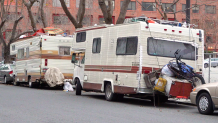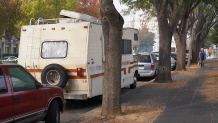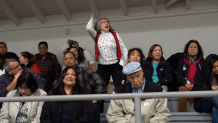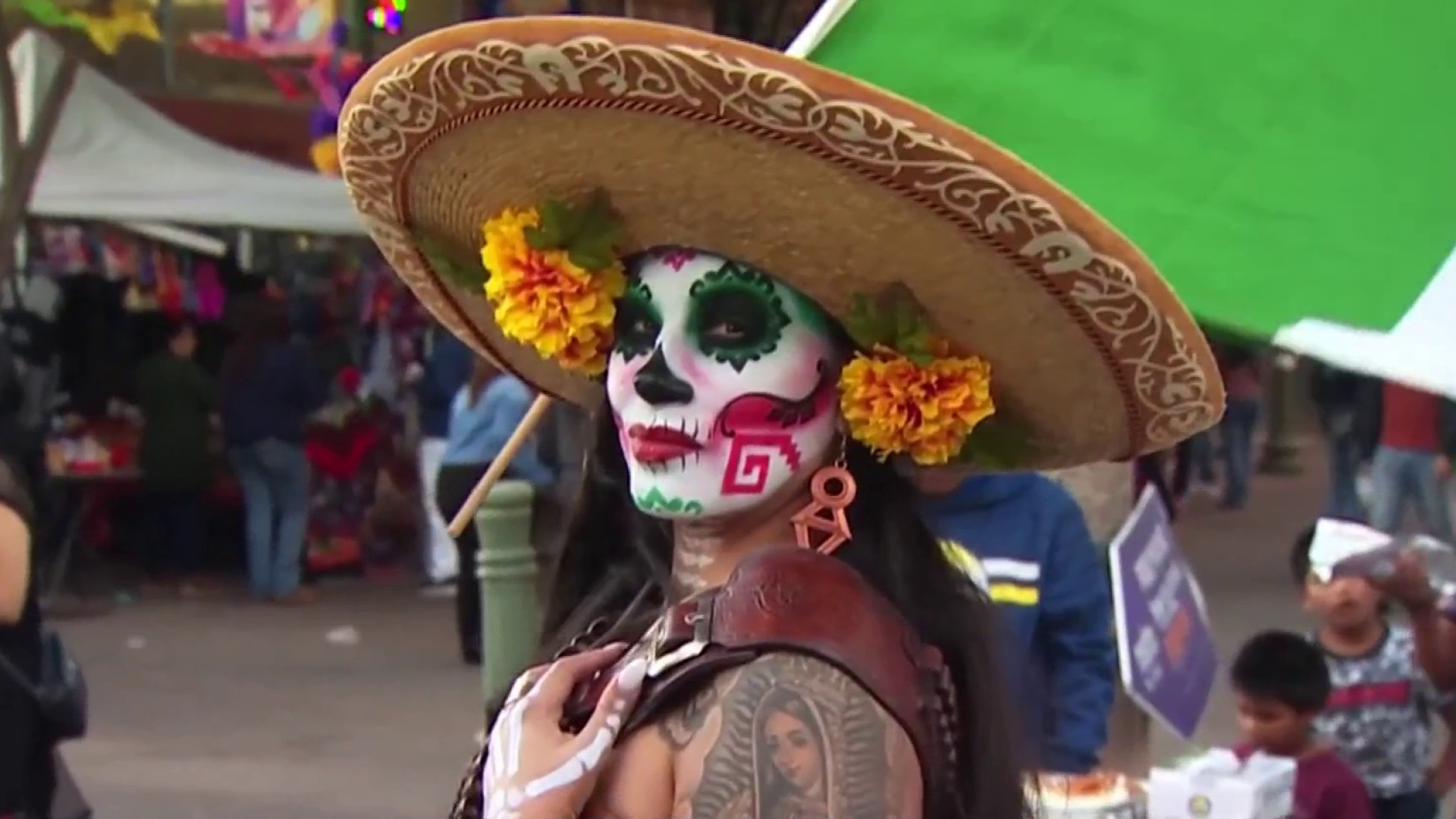What to Know
- At least 300 RVs in San Francisco are home to individuals, couples or families, according to the city
- Most inhabited RVs are south of Market Street, on blocks without parking restrictions
- City leaders are considering new ways to offer housing assistance to those living in vehicles
Though the official count is in the hundreds, it's been estimated that well over a thousand people in San Francisco go to sleep in their vehicles every night, parked on city streets.
The most visible of these people are the ones now at the center of a fiery debate: the residents of an estimated 313 RVs, many of them decades old and barely functioning, that bounce from block to block, dodging parking restrictions, and sometimes leaving a trail of garbage and angry neighbors in their wake.
"Those are not proper homes. They do not belong in residential neighborhoods," District 9 Supervisor Hillary Ronen said at a tense community meeting.

But much like the angry renters and homeowners in Ronen's district, the RV dwellers say they're just trying to live a drama-free life in what's become the most expensive city in the world. We visited three of them to learn what their daily existence is like.
1. Joey Martinez
Local
It started out as a dream that Joey Martinez now admits was horribly misguided.
"I came up with the bright idea to purchase an RV," Martinez said. "The rent was getting expensive, and … I was just planning on seeing the world, seeing the country and just driving around."
Joey Martinez gutted this water-damaged RV and did much of the new woodwork himself. Though it's now a suitable shelter, it still lacks plumbing for water and propane. - Spherical Image - RICOH THETA
Joey Martinez gutted this water-damaged RV and did much of the new woodwork himself. Though it's now a suitable shelter, it still lacks plumbing for water and propane.
Martinez thought he was getting a bargain, but he got more than he bargained for: A tall, modern-looking motorhome that turned out to be riddled with water damage and mold. As he tore into it, trying to make it habitable, he discovered another problem: without a catalytic converter or oxygen sensor, the engine couldn't pass a California smog test, which is required to register a vehicle.
"Literally, I'm stuck," he said. "I can't go anywhere because I have no plates and I have no registration."
By agreement with city officials, Martinez now parks his half-working RV on a corner that was once a garbage dumping ground, and helps keep the area clean. He said he misses the simple things in life.
"The luxury of the sound of a toilet flushing is just — if you don't have that, or power — you have to look for your own power and water source — it's so stressful," he said. "Every day is a survival situation."
2. Rudolph Fisher
Mayor London Breed often talks about growing up in San Francisco's housing projects, but she rarely talks about her downstairs neighbor, Rudolph Fisher, who says he lived below her at the corner of Turk and Laguna years ago.
Fisher, now 65 years old, said he lost his housing after a conviction for receiving stolen property made him ineligible for housing assistance. Private landlords weren't eager to rent to him either, and he's been homeless in one form or another since 2002.
Rudolph Fisher lives in this 1978 Chevy RV, where he occasionally gets visits from family and friends. The vehicle runs and has valid license plates, and Fisher says he'd happily sell it if he had someplace else to go. - Spherical Image - RICOH THETA
Rudolph Fisher lives in this 1978 Chevy RV, where he occasionally gets visits from family and friends. The vehicle runs and has valid license plates, and Fisher says he'd happily sell it if he had someplace else to go.
"I sleep at family's sometimes, I slept on the bus once or twice, I slept in cars, slept in trucks," he said.
Now, Fisher lives in a 40-year-old Chevy Itasca RV parked on a mostly-industrial block in the Bayview District where street sweepers and parking enforcement won't bother him.
"It's a daily ritual," he said. "I have to supply it with water, I have to supply it with gas, oil, and then I have to do the food."
Fisher, who suffers from COPD and diabetes, said that like the RV itself, life on the streets is getting old.
"I'm done with living like this," he said. "This is not a good way to live. There's no room. I'd like to come back to Earth and get a nice little apartment, a studio apartment."
3. Couper Orona
In early 2018, when San Francisco began cracking down on tent encampments, Couper Orona knew she had to find a different kind of shelter. Homelessness was a new and unexpected turn of events for her, after she became disabled and then went through a messy divorce.
"I lived in Diamond Heights," she said. "Drove an Audi. Had a good life, you know. And just overnight, like that, everything's gone."
Couper Orona bought this aging RV from a friend after city officials swept the tent encampment where she had been living. With shelter from the rain, a tiny kitchen and a private bathroom, she said it feels a like a castle. - Spherical Image - RICOH THETA
Couper Orona bought this aging RV from a friend after city officials swept the tent encampment where she had been living. With shelter from the rain, a tiny kitchen and a private bathroom, she said it feels like a castle.
Orona said she bought an RV from a friend who couldn't take care of it anymore, and now parks it with a group of other inhabited vehicles at the edge of a parking lot in the Mission District. Most days, she's just grateful to have a (sometimes leaky) roof over her head, and a place she can cook and use the bathroom, she said.
"It's huge, this is like a castle to me," she said. "I appreciate every bit that I have, and I don't take it for granted anymore."
As a single woman living on the street, Orona said she learned to make friends with those who would watch her back. Now, she said, crime is no longer her primary worry: she's far more concerned about new city enforcement efforts.
"This almost got towed one day," she said. "I could care less if there's a guy down the street with a gun … I'm more scared of them breaking into my house and taking my RV and putting my cat at the pound."
The Struggle for a Solution
Though vehicle dwellers have quietly subsisted in San Francisco for many years, tightening parking restrictions have forced them into denser and more visible clusters on the few streets where they're still allowed to park. District 11 Supervisor Ahsha Safaí said these clusters are what have aroused the ire of neighbors.
When the Board of Supervisors adjourned for the winter holidays, there were two competing efforts to curb complaints over RV living in the city. The first, backed by Safaí, Mayor Breed and District 5 Supervisor Vallie Brown, would explore locations for an "RV triage center" where those living on wheels could come to store their vehicles while getting registered for housing assistance. In some cases, the city would offer to "buy back" RVs from their owners for cash.
Brown said the likelihood of finding suitable housing will depend a lot on who's asking: Families with children, veterans and seniors would be among the first to get help, while young and healthy individuals might wind up on the city's lengthy shelter wait list.

Safaí said as part of that plan, the supervisors would seek tighter citywide restrictions on the parking of oversized vehicles in residential neighborhoods. RV dwellers who register before a certain date will be eligible for a degree of leniency and assistance, while those who come into the city after that date would be subject to fines and towing, he said.
The second proposal comes from District 9 Supervisor Hillary Ronen, who said she'd initially planned to get on board with Brown and Safaí, but became impatient under pressure from her constituents. The fiery meeting at which she spoke packed a gymnasium full of angry renters and homeowners in the hilly, mostly-residential Portola neighborhood, where RVs can roam free of street sweeping and permit parking restrictions.
Ronen said she would start by banning tall vehicles from parking overnight in the Portola neighborhood, then introduce legislation setting a 6-month deadline for the city to open a triage or navigation center for RVs. Included in her plan would be the option for a "safe parking" program, allowing RV residents to continue living in their vehicles in a designated spot, away from neighborhoods, with garbage and bathroom facilities on site.

Advocates from the Coalition on Homelessness say they studied a safe parking program in San Diego, and found it could be a good fit for San Francisco, if used as a temporary step on the way to stable housing.
"A lot of what is needed is time," said Kelley Cutler, a human rights organizer for the Coalition. "Time to actually get into housing — because it's not going to be quick."
Cutler said the Coalition found RV dwellers in San Diego were able to get into more permanent housing within 4 to 6 months of enrolling in the city's safe parking program. A program like it in San Francisco would also eliminate another threat: the worry of having RVs towed away and impounded by the city after they accumulate too many parking tickets.
On December 18, the Coalition filed a lawsuit against the city aiming to stop authorities from impounding vehicles with unpaid tickets when those vehicles serve as the owner's only home or shelter.
In a statement, the City Attorney's spokesperson, John Cote, responded, "We're sympathetic to those who are homeless, including those who have nowhere to sleep other than in their cars."
Cote added that the SFMTA recently reduced towing fees for low-income people, and has long offered the option to perform community service in lieu of payment for those who can't afford their parking tickets.
"The bottom line is there is a way to take care of a parking ticket even if you can't pay for it. Letting parking tickets just pile up is not an acceptable choice," Cote's statement said.
In spite of the constant cat-and-mouse game with parking authorities, the San Francisco RV dwellers we spoke to said an offer of housing from the city wouldn't necessarily be a done deal.
In many cases, the first permanent housing option offered to homeless individuals is an SRO: a Single Room Occupancy hotel. Orona and Fisher both said they'd rather continue living in their vehicles than accept the restrictions that come along with SRO living.
"Why would I get rid of this to go into an SRO where I can't have visitors, I can't cook on the stove, I don't have my own bathroom?" Orona said. Looking around the cluttered living room of her RV, she added, "I mean, it's not much, but this is mine."



